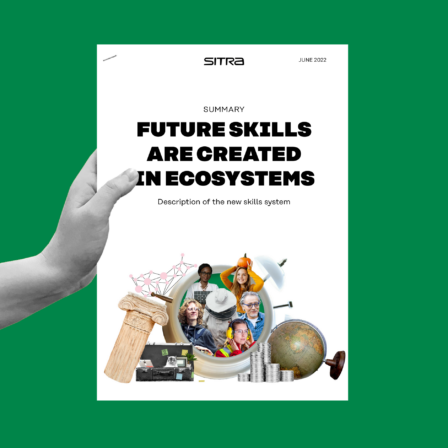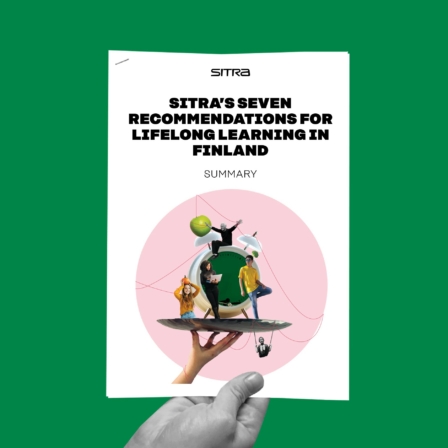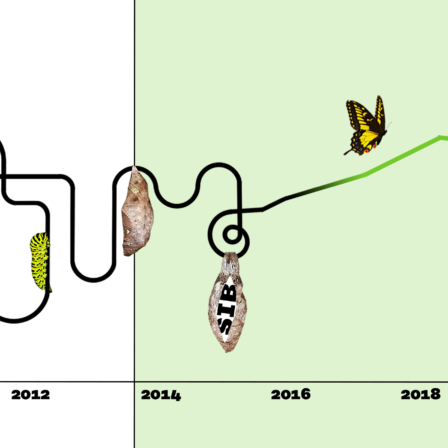The impacts of coronavirus have further highlighted the importance of continuous competence building. A person who loses their job also loses the opportunity to build their competence through their work. The longer one’s unemployment lasts, the more important it is to maintain and develop one’s competence.
A memorandum published today by Sitra Työttömien näkökulma elinikäiseen oppimiseen (summary in English) gives an overview of the opportunities for unemployed people to develop their competence.
‘The world is changing rapidly, as are workplace competence requirements. For this reason, it is important that services for the unemployed take individuals’ particular situations into account,’ says Sinimaaria Ranki, Leading Specialist at Sitra.
‘In all life situations, it should be possible to develop one’s competence, as this has a central impact on people’s well-being. Continuous competence building is also a prerequisite for the future competitiveness of companies and society as a whole.’
Bottlenecks are often structural – for example, regulation and discretionary benefits
Unemployed people would prefer to build their competence in ways that allow them to combine studying with work, such as apprenticeship training and vocational labour market training.
In the opinion of all parties concerned – the unemployed, the persons advising them and the government officials alike – more time is needed for the face-to-face encounters between the unemployed and the person advising them.
The memorandum raises the question as to whether one way of achieving this could be to simplify complex regulations. It would free up TE Offices’ time for personal encounters with customers that serve both to build trust and to develop cooperation with employers and education institutions. This would enable a better match between the jobseeker’s competence and the knowledge and skills needed in the workplace.
The central bottleneck for competence building and employment is related to the individual discretionary nature of unemployment benefits received during studies.
‘It would be interesting to find out whether trust in an unemployed person’s own ability to assess the suitability of opportunities for vocational competence building could make labour policy more efficient and effective,’ Ranki suggests.
Are corrective actions targeted at the individual or the system?
While the unemployed person is expected to be active in seeking training, the authority to make decisions on the matter rests in the end with the government official.
On the other hand, the unemployed person is responsible for finding employment, even though they face many challenges in this that they cannot themselves have any impact on regardless of any competence building. Examples of these include age, the status of being unemployed, discrimination related to cultural background and the qualification-centred nature of competence assessment.
It is therefore essential to examine the relationship between the individual and the system in the building of competence among the unemployed.
‘The measures aimed at rectifying deficiencies often target the individual, even though the problem may in fact lie in the structures of society. The key conclusion is that those planning to develop the knowledge and skills of the unemployed must clearly identify when the labour policy measure should be targeted at the individual and when it should be targeted at the system as a whole,’ Ranki says.
In the memorandum submitted by Sinimaaria Ranki, a voice is given to the unemployed themselves and the persons advising them in their vocational development, as well as specialists from the Employment and Economic Development Office. In addition, sociology and economics researchers Juho Alasalmi, Henna Busk, Markus Jäntti, Lena Näre and Sari Näre examine competence building for the unemployed from the viewpoints of young unemployed people, the discretionary nature of study-based unemployment benefits, the effectiveness of employment services, and human capital.
The data was collected between August 2019 and January 2020.
The memorandum on the competence building opportunities of unemployed persons contributes to a comprehensive change in the lifelong learning policy in Finland by presenting the perspective of the unemployed. Sitra acts as a bridge builder accelerating this change.

















Recommended
Have some more.